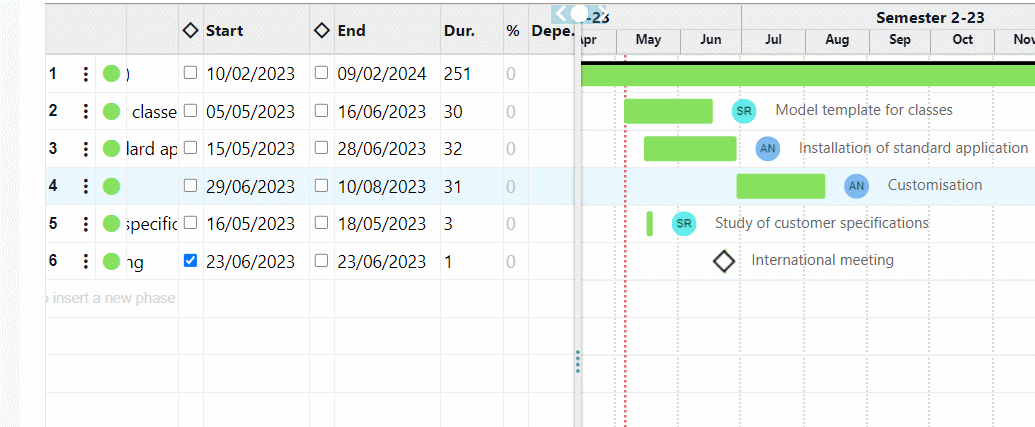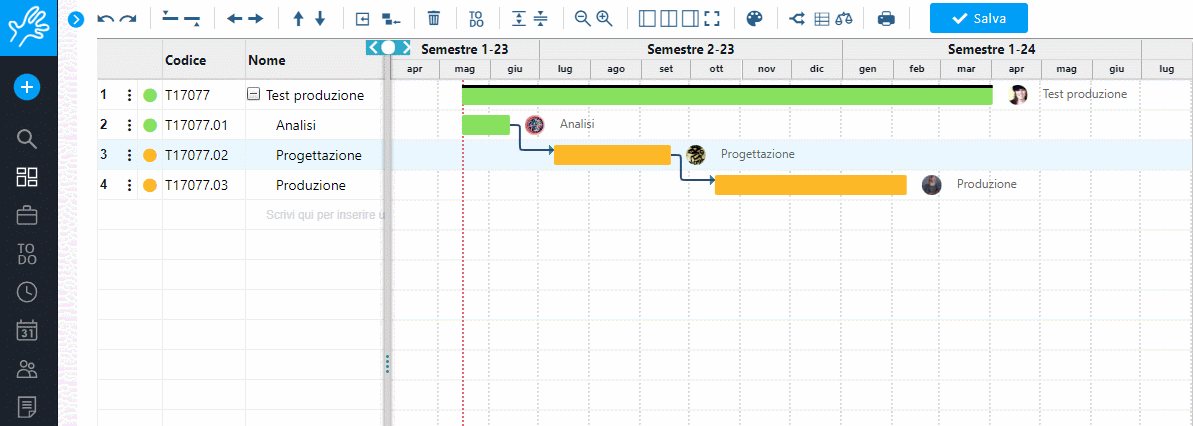After months of study and implementation we are really happy to announce that a new version of Twproject has been released and it includes, among other optimizations, a particular step forward on the use of the Gantt chart.
The Gantt developed by Twproject is undoubtedly one of the best on the current market in terms of flexibility and interaction with other pages in the application. It is also one of the few that allows you to do all sorts of tests on project duration and dependencies, thus proving to be a useful tool not only when sharing timelines but also in the process of studying them.
As always, the new release will be for the immediate benefit of all our customers, who can start using the new features right away!
Dependencies in the Gantt
According to definition, in the context of project management, “dependency” is defined as the relationship between two activities in a project or between an activity and a milestone (a precise point that defines the beginning or end of a relevant phase).
Dependencies thus allow one phase to be linked to the next in a way that indicates that they are consequential.

Introduction of new types of dependencies in the Gantt

Until now in Twproject, the dependencies between project phases that the user could enter were of one type, the so-called classic Finish to start (FS). This means that activity A must finish before activity B starts, or in other words, activity B cannot start before A is finished.
But as we delved deeper into this topic and also through feedback from our clients, we realized that limiting the possible relationships that exist between the phases of a project to this classic type of dependency was reductive. In fact, there are additional relationships that can develop between the activities to be performed and that have been theorized in the principles of project management. Let us look at them in detail:

- The Finish to finish (FF) relationship type implies that activity B cannot finish before A is also finished. For example, if activity B is the completion of writing a book and activity A is the writing of the last chapter, it becomes clear that A must necessarily finish for B to be considered finished as well.

- Furthermore, there is the case that a certain activity cannot begin before another activity has in turn begun, and in this case the relationship will be Start to Start (SS). A classic example is the project management activity (B) of a project that cannot start before the project itself (A) begins.

- Finally, a very specific case is the last type of relationship called Start to finish (SF), which is probably the most complex to understand and applies only in certain contexts. In this case activity A must start before B finishes, or in other words B cannot finish until A is started. Such a scenario may arise, for example, during shift change in a manufacturing plant whose machinery needs constant monitoring. The initial shift (A) cannot be said to have ended unless the next shift (B) has already started, on pain of putting the plant at risk.
We are therefore overjoyed to announce that in the new release of Twproject we have introduced the ability to assign all of the above types of dependencies to project phases.
After creating the dependency between two phases, you can possibly change the default value represented by the FS dependency and select another type of relationship.

The application of the concept of “elasticity”
Another important paradigm shift, which makes us very proud of our work, is that we have made all the newly added dependencies “elastic.”
Indeed, if until now the assignment of a dependency established the linear succession of one activity after another, we know well that in the real world the downtimes.
That is why Twproject decided to allow the user to freely manage this elasticity.
So from now on when you enter a dependency it will be saved at first with the default FS hard type. But this classic “hard” dependency can be converted into “elastic” and with any type of relationship.
This means that two interdependent activities may also not be chronologically consequential and move apart, leaving any gaps between them, or overlap for a time, as long as the logic of chosen dependence is respected.
This is a big change in terms of sticking to the facts when carrying out a concrete project and reinforces the concept of delegation that is central in Twproject.
Imagine a project tree where a Project Manager (PM) is assigned for the whole project and then a specific one for each phase, one for the analysis(PMA), design(PMG) and production(PMD) phase, these phases are linked by an FS dependency.
The PM can define a total project duration and assign a specific duration to the phases, thanks to the elastic dependencies, he can, while maintaining the logic of the dependencies, create a lag between the phases and therefore leave to PMA, PMG and PMD great freedom of action (moving end and start data) without affecting the overall dates!

This was not possible before, since a postponement of an end date, for example of the analysis phase, would necessarily have led to a postponement of the consequent phases, phases over which PMA has no right.
Other news
But it doesn’t end there. With this release Twproject has made really a lot of improvements to the system, a full list of which you can find on the changelog page.
Here’s a sampling of them:
Revenues: a useful tool for turning an estimated value into actual revenue has been introduced to further facilitate the entry of these items.
Worklogs: filters by ToDo and by project have been added to the worklog analysis sheet, and in addition a column with the sum of total worklogs on a phase or project has been added on the timesheet.
Role security: we have made permissions on task management even more secure in relation to cost and form entry.
Agenda: various improvements have been made to the agenda, including the ability to view the duration of ToDo’s, and in addition, events entered in the agenda have been integrated into a dedicated row on the ToDo and resource planner.
So, don’t waste any time and go find out now how much these latest innovations from Twproject will benefit the efficiency of your work!
All clients using Twproject on the cloud will get the update automatically in the coming days, while those who have Twproject installed on their own servers can find the new installers here.


